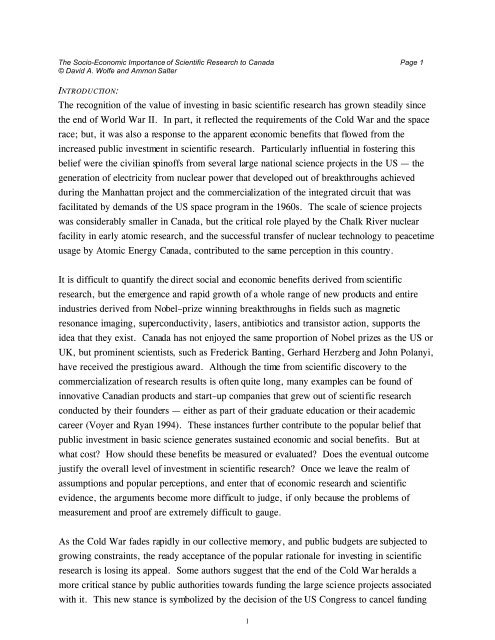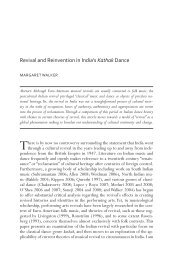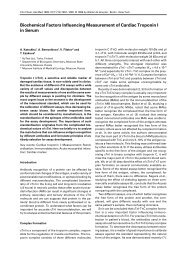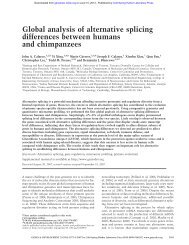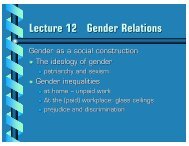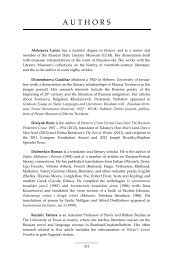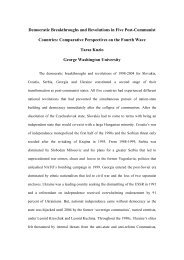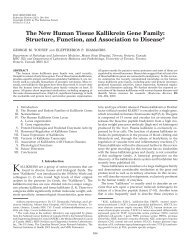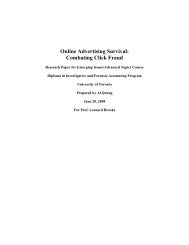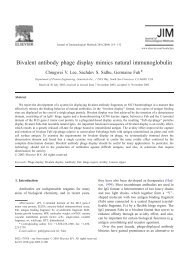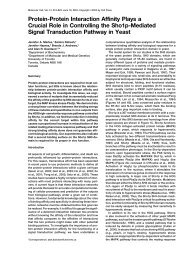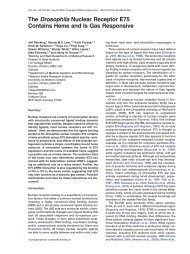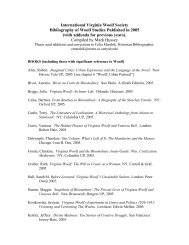The Socio-Economic Importance of Scientific Research To Canada
The Socio-Economic Importance of Scientific Research To Canada
The Socio-Economic Importance of Scientific Research To Canada
You also want an ePaper? Increase the reach of your titles
YUMPU automatically turns print PDFs into web optimized ePapers that Google loves.
<strong>The</strong> <strong>Socio</strong>-<strong>Economic</strong> <strong>Importance</strong> <strong>of</strong> <strong>Scientific</strong> <strong>Research</strong> to <strong>Canada</strong> Page 1© David A. Wolfe and Ammon SalterINTRODUCTION:<strong>The</strong> recognition <strong>of</strong> the value <strong>of</strong> investing in basic scientific research has grown steadily sincethe end <strong>of</strong> World War II. In part, it reflected the requirements <strong>of</strong> the Cold War and the spacerace; but, it was also a response to the apparent economic benefits that flowed from theincreased public investment in scientific research. Particularly influential in fostering thisbelief were the civilian spin<strong>of</strong>fs from several large national science projects in the US — thegeneration <strong>of</strong> electricity from nuclear power that developed out <strong>of</strong> breakthroughs achievedduring the Manhattan project and the commercialization <strong>of</strong> the integrated circuit that wasfacilitated by demands <strong>of</strong> the US space program in the 1960s. <strong>The</strong> scale <strong>of</strong> science projectswas considerably smaller in <strong>Canada</strong>, but the critical role played by the Chalk River nuclearfacility in early atomic research, and the successful transfer <strong>of</strong> nuclear technology to peacetimeusage by Atomic Energy <strong>Canada</strong>, contributed to the same perception in this country.It is difficult to quantify the direct social and economic benefits derived from scientificresearch, but the emergence and rapid growth <strong>of</strong> a whole range <strong>of</strong> new products and entireindustries derived from Nobel–prize winning breakthroughs in fields such as magneticresonance imaging, superconductivity, lasers, antibiotics and transistor action, supports theidea that they exist. <strong>Canada</strong> has not enjoyed the same proportion <strong>of</strong> Nobel prizes as the US orUK, but prominent scientists, such as Frederick Banting, Gerhard Herzberg and John Polanyi,have received the prestigious award. Although the time from scientific discovery to thecommercialization <strong>of</strong> research results is <strong>of</strong>ten quite long, many examples can be found <strong>of</strong>innovative Canadian products and start–up companies that grew out <strong>of</strong> scientific researchconducted by their founders — either as part <strong>of</strong> their graduate education or their academiccareer (Voyer and Ryan 1994). <strong>The</strong>se instances further contribute to the popular belief thatpublic investment in basic science generates sustained economic and social benefits. But atwhat cost? How should these benefits be measured or evaluated? Does the eventual outcomejustify the overall level <strong>of</strong> investment in scientific research? Once we leave the realm <strong>of</strong>assumptions and popular perceptions, and enter that <strong>of</strong> economic research and scientificevidence, the arguments become more difficult to judge, if only because the problems <strong>of</strong>measurement and pro<strong>of</strong> are extremely difficult to gauge.As the Cold War fades rapidly in our collective memory, and public budgets are subjected togrowing constraints, the ready acceptance <strong>of</strong> the popular rationale for investing in scientificresearch is losing its appeal. Some authors suggest that the end <strong>of</strong> the Cold War heralds amore critical stance by public authorities towards funding the large science projects associatedwith it. This new stance is symbolized by the decision <strong>of</strong> the US Congress to cancel funding1


